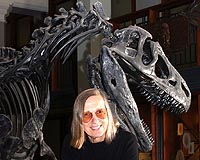 Princeton geoscientist Gerta Keller and a research team have compiled new evidence disproving a popular theory that an asteroid wiped out the dinosaurs about 65 million years ago. Examinations at several new sites have produced biotic evidence - the fossilized traces of plants and animals - indicating that a massive die-off did not occur directly after a proposed asteroid strike but much later. (Photo: Denise Applewhite) |
Princeton NJ (SPX) May 05, 2009
A Princeton University geoscientist who has stirred controversy with her studies challenging a popular theory that an asteroid wiped out the dinosaurs has compiled powerful new evidence asserting her position.
Gerta Keller, whose studies of rock formations at many sites in the United States, Mexico and India have led her to conclude that volcanoes, not a vast meteorite, were the more likely culprits in the demise of the Earth's giant reptiles, is producing new data supporting her claim.
Keller, a Princeton professor of geosciences, and several co-authors lay out the case in a paper published April 27 in the Journal of the Geological Society of London.
Examinations at several new sites have produced "biotic evidence" - the fossilized traces of plants and animals tied to the period in question - indicating that a massive die-off did not occur directly after the strike but much later.
In addition, Keller and other researchers have found "aftermath" sediments that remained undisturbed and showed signs of active life, with burrows formed by creatures colonizing the ocean floor. This would quash a theory advanced by some that a massive tsunami followed the impact, Keller said.
"Careful documentation of results that are reproducible and verifiable will uncover what really happened," Keller said. "This study takes an important step in that direction."
Much of the new data comes from a trench dug out of low-lying hills in northeastern Mexico at a site called El Penon. A group of Princeton undergraduates accompanying Keller on a field trip to Mexico in 2004 excavated the area and uncovered the new evidence. Keller and her team have been analyzing that evidence for the last several years.
Understanding what caused the dinosaurs to disappear remains a great mystery.